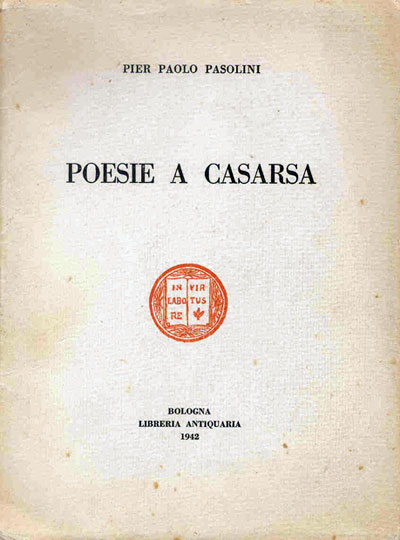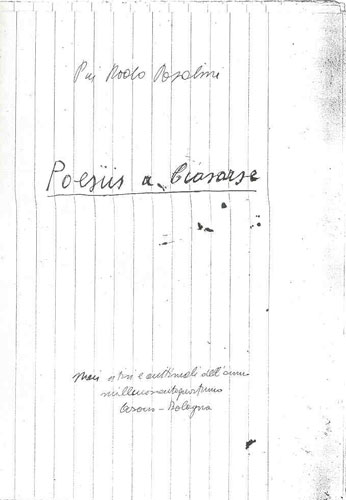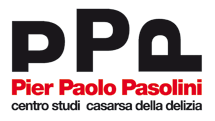
On 14th July 1942 Pasolini published at his own expenses the collection Poesie a Casarsa (Poems in Casarsa) in the Marino Landi Antique Library of Bologna.These are 14 poems written in his mother’s dialect and dedicated to his father (as in the title page). The book was immediately noticed and reviewed by Gianfranco Contini in the essay Al limite della poesia dialettale, published in Ticino Newspaper on 24th April 1943. Contini recognizes the linguistic qualities of Poesie a Casarsa and underlines in a particular way the use of the dilect “di ca da l’aga” (the dialect spoken in the west side of the Tagliamento river): a type of Friulian that creates its own poetic koine, born from the needs to write a language which was only spoken until that moment.The choice of this dialect as the language of poetry became the symbol of a young intellectual challenge towards the “real father” and the “power-father”, and embracing the suggestion of new politic and social open-mindedness, together with the need of a poetic renewal.
[blockquote author=”P.P. Pasolini, Empirismo eretico, Garzanti, Milano, 1972, p. 62″ link=”” target=”_blank”]Risuonò la parola ROSADA. Era Livio, un ragazzo dei vicini oltre la strada, i Socolari, a parlare. Un ragazzo alto e d’ossa grosse… Proprio un contadino di quelle parti… Ma gentile e timido come lo sono certi figli di famiglie ricche, pieno di delicatezza, poiché i contadini, si sa, lo dice Lenin, sono dei piccolo-borghesi. Tuttavia Livio parlava certo di cose semplici ed innocenti. La parola “rosada” pronunciata in quella mattinata di sole, non era che una punta espressiva della sua vivacità orale. Certamente quella parola in tutti i secoli del suo uso nel Friuli che si stende di qua del Tagliamento, non era mai stata scritta. Era stata sempre e solamente un suono. Qualunque cosa quella mattina io stessi facendo, dipingendo o scrivendo, certo m’interruppi subito […] E scrissi subito dei versi, in quella parlata friulana della destra del Tagliamento, che fino a quel momento era stata solo un insieme di suoni: cominciai per prima cosa col rendere grafica la parola ROSADA.[/blockquote]
The collection opens with a brief introduction inspired to the rogge (artificial canals) that flew across the territory of Casarsa and describes the freshness and pureness of a world that needs to be discovered.
[blockquote author=”Pier Paolo Pasolini” link=”” target=”_blank”]Fontana di aga dal me paìs. A no è aga pì fres-cia che tal me paìs. Fontana di rustic amòur.[/blockquote]
Poesie a Casarsa represents the first sign of his opposition to the Fascist regime and the attempt to give the dialect value. The society banned the language spoken by the rural masse because it was considered a barbaric language. Also the Left prefer the use of Italian. The Fascism- wrote Pasolini- didn’t tolerate the use of the dialects, signs of an irrational unity of the country in which I was born; unacceptable and shameless realities of the nationalists’ attitude.( in P.P.Pasolini , Poeta nelle ceneri, by E.Siciliano, in “Nuovi Argomenti; Roma, luglio 1980).

Manoscritto originale di Pier Paolo Pasolini



